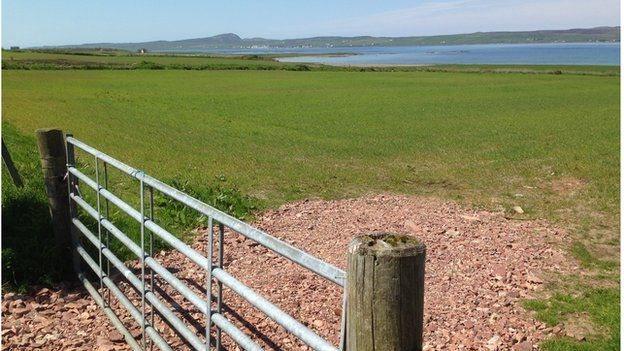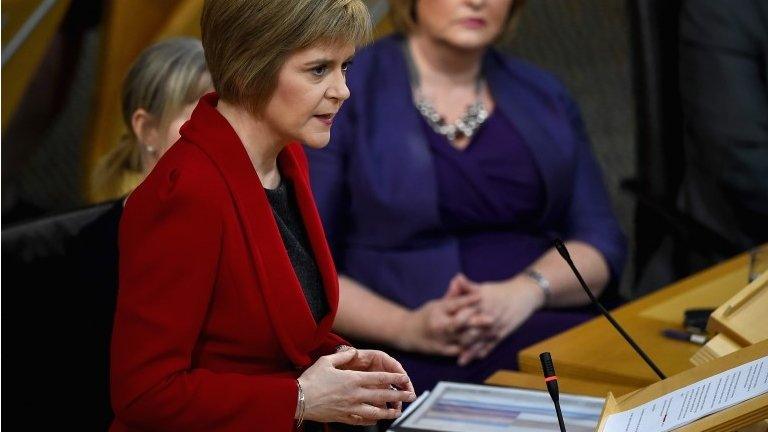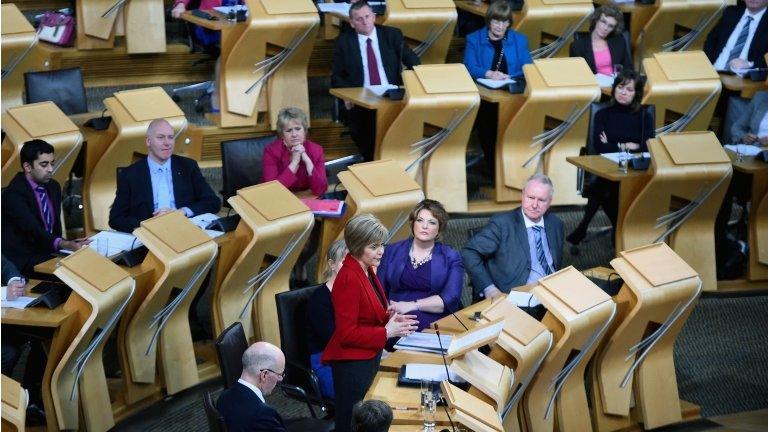'Radical' Scottish land reform plan unveiled
- Published
A tax exemption for sporting estates has applied since 1994
The Scottish government has published "radical" proposals aimed at widening the ownership of land across the country.
It has been estimated that half of the privately-owned land in Scotland is controlled by 432 people.
The Land Reform Bill, external will end tax relief for shooting estates and force the sale of land if owners are blocking economic development.
However, it has been described as a "land grab" by opponents.
Landowners on sporting estates stopped paying business rates in 1994 after being given an exemption by then prime minister John Major's Conservative government.
The Scottish government had previously said the tax exemption was unfair and must end.
It has proposed using the additional money raised by ending the tax exemption to treble the Scottish Land Fund, external - which is used to help support community buyouts of land - from £3m this year to £10m a year from 2016.
But landowners have claimed re-introducing the rates could make some sporting estates unprofitable and force gamekeepers out of work.
Nicola Sturgeon set out the land reform proposals shortly after becoming Scotland's first minister in November of last year.
She said at the time that "Scotland's land must be an asset that benefits the many, not the few".
Other proposals in the bill include:
measures to clarify information about land, its ownership and its value, with a Scottish Land Reform Commission being set up to make recommendations on future reforms.
encouraging better information and greater transparency on the ownership of land, through the land register
strengthening regulations where land owners are failing to take their deer management responsibilities seriously
improvements to both systems of common good land and right to roam.
The Scottish government has set a target of doubling the amount of land in community ownership from the current 500,000 acres to one million acres by 2020.
It has held a 10-week consultation, external on its proposals.

Who owns Scotland?

By BBC Scotland correspondent James Cook
On a dusty track just outside Islay's main settlement, Bowmore, Alasdair and Rachel Whyte are standing at a metal gate.
It affords a view of the bay and the hills beyond but their eyes are on the fields in the foreground.
"The sun may be shining but there is a cloud over Islay," says Mrs Whyte, in a lyrical island lilt.
These fields, she explains, were in her husband's family for more than a century, passed down through five generations of Whytes.
They did not own the land but were tenant farmers, part of a feudal system which survives to this day.
Three years ago the land here was taken off the Whyte family when Mr Whyte's sister Aileen died suddenly at the age of 47, unmarried, childless and without a will.
The tenancy of the 100 acres was in her name and the law did not regard her brother as a close relative.

David Johnstone, chairman of Scottish Land and Estates, which speaks for private landowners, had previously said that sporting estates were "too readily singled out in a negative light", when in fact "they were businesses that made a key contribution to rural tourism, local employment and the environment".
And the Scottish Conservatives have also criticised the government's proposed reforms as "a Big Brother-style land grab".
Land Reform Minister Aileen McLeod said: "We cannot underestimate the crucial part land reform will play in contributing to the future success of communities across Scotland.
"Through the Land Reform Bill we want to ensure that future generations have access to land required to promote business and economic growth and to provide access to good quality, affordable food, energy and housing.
"The introduction of the bill is a significant step forward in ensuring our land is used in the public interest and to the benefit of the people of Scotland. It will also end the stop start nature of land reform in Scotland that has limited progress."
Scottish Labour's environment spokeswoman Sarah Boyack said there was still unfinished business to address since Holyrood's land reform act was passed a decade ago.
She explained: "Communities in both urban and rural Scotland have much to gain from proposed new opportunities to buy and access land to further sustainable development. Crucially, this legislation will also be the opportunity to strengthen tenant farmers' rights.
"I look forward to discussing with local communities, tenant farmers and land owners how we make better use of our land to create new opportunities to regenerate communities and create new homes and jobs. We need to make sure the detail in the bill is up to the challenges we face now and in the future."
'The government has been warned'
However, the Scottish Conservatives said the SNP's land reform plan was rooted in ideology and "will cost local jobs in rural communities".
The party's Murdo Fraser said: "People living in rural Scotland want to see a strong economy, more jobs created, better broadband and local services improved.
"Instead, the SNP is ignoring the evidence and pursuing an ideologically-driven agenda which will jeopardise the rural economy.
"These proposals would lead to greater government interference in land ownership and an increase in the tax burden on rural businesses.
"The Scottish government has been warned that this will cost jobs, but has ignored those warnings."
- Published26 November 2014

- Published27 November 2014
